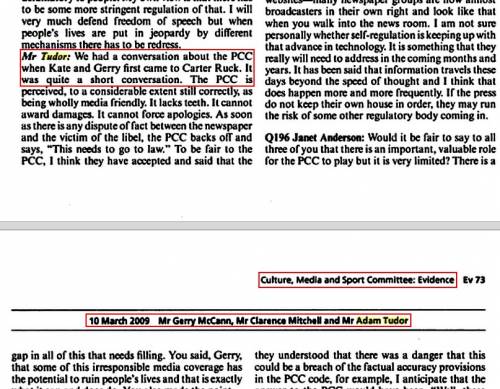Adam Tudor
 →Adam Tudor joined Carter-Ruck in 2001 and became a Partner in 2003.
He specialises in media litigation and reputation management, and is also spearheading the firm's commercial litigation practice. His clients range from multi-national corporations and leading business people, to a number of national governments and heads of state, as well as other high-profile politicians and celebrities.
→Adam Tudor joined Carter-Ruck in 2001 and became a Partner in 2003.
He specialises in media litigation and reputation management, and is also spearheading the firm's commercial litigation practice. His clients range from multi-national corporations and leading business people, to a number of national governments and heads of state, as well as other high-profile politicians and celebrities.
…Adam has conducted appeals for corporate clients in the House of Lords (now the Supreme Court) and Privy Council. In libel circles, Adam is best known for representing Kate and Gerry McCann in their libel and privacy complaints. In 2008, he secured unprecedented front page apologies from the Daily Express, Daily Star and their sister Sunday titles, as well as £550,000 in damages for libel. Adam also obtained apologies and £375,000 in libel damages from the Express group for the seven friends who were dining with the McCanns on the night Madeleine was abducted. All the damages in these cases were applied to the search for Madeleine. During 2011 Adam has been advising Mr and Mrs McCann in relation to their evidence before the Leveson Inquiry.
…Adam's first major libel victory was in 2001, when, at his previous firm, he represented Alan (now Lord) Sugar in his successful libel action against the Daily Mail, which resulted in a jury awarding damages of £100,000, the highest jury award that year. Adam has regularly lectured to the profession and made a number of television and radio appearances, including on Radio 4's “Unreliable Evidence”. He has also been named →"Lawyer of the Week" in The Times newspaper. Adam was invited to give evidence at the House of Commons before the Culture, Media and Sport Committee in its inquiry into press standards, privacy and libel.
Article Times Online April 8, 2008:
→"Lawyer of the Week" Timesonline - Adam Tudor, By Linda Tsang
Adam Tudor, a partner at Carter-Ruck, represents the parents of Madeleine McCann. After stories in the Daily Express and the Daily Star and their Sunday stablemates, the newspapers have made unprecedented front-page apologies to the McCanns for falsely suggesting that the couple caused the death of their daughter and covered it up. The papers will pay £550,000 to the Madeleine fund.
Q: What were the main challenges and the possible implications?
The main challenge was logistical — the sheer size of the task of complaining about more than 100 articles. The implications, I hope, include the media resolving to adopt a more responsible approach to this kind of reporting. Most importantly, I hope that this outcome will remind the world that at the heart of the press hysteria and distortion lies a normal, loving family who simply want to find their daughter.
…
Q: What was your most memorable experience as a lawyer?
Naturally it would be pretty hard to top Mr and Mrs McCann's victory against Express Group. That aside, there's nothing quite like a libel trial and the tension of a jury verdict. My most memorable was probably when I acted for a local councillor against a tycoon who kept towing banners about her behind his aircraft. The trial went on for a fortnight, my client won very substantial damages and my wife gave birth to our daughter a few hours later.
Q: Who has been the most influential person in your life and why?
I have a wonderful and preternaturally tolerant wife, and two children who keep me very much on my toes. Professionally, I was very lucky to have worked with some superb litigators at Herbert Smith, and at Carter-Ruck I am surrounded by people who are among the leaders in our field.
…
 You may find Adam Tudor also in approach to the Levenson Inquiry on e.g. →Press standards, privacy and libel: second report of session 2009-10 ..., Band 2 House of Commons Report 10-May-2009. For Carter Ruck “first” meeting with McCann's he states that this was after they approached →PCC for libel allegations against the British Press.
You may find Adam Tudor also in approach to the Levenson Inquiry on e.g. →Press standards, privacy and libel: second report of session 2009-10 ..., Band 2 House of Commons Report 10-May-2009. For Carter Ruck “first” meeting with McCann's he states that this was after they approached →PCC for libel allegations against the British Press.
But this is clearly not true as proven by the press photo on 22-May-2007 when he accompanied Gerry McCann and Clarence Mitchell to their flight back to Praia da Luz at the very beginning of the drama already year(s) earlier.
Recent Article by Adam Tudor (27-Nov-2014) →Plebgate — how new libel laws have changed the defamation landscape:
(This article by Adam Tudor was first published in The Times on 27 November 2014)
Plebgate is back. …Already a saga with twists and turns, Plebgate now has the hallmarks of the great showpiece libel trials of yesteryear. But one thing will be missing: a jury. This is a trial by judge alone, and thanks to the Defamation Act 2013, it is likely we will never again see a trial by jury in the libel courts — a constitutional shift ending what had been a near-sacrosanct principle for more than two centuries.
So how else has the act changed to the libel landscape? The act came into force on January 1 this year. At first blush, it is a sensible nod to the plain English lobby. The old defence of “justification” became “truth” and “fair comment” morphed into “honest opinion”. Another user-friendly change is the consolidation of judge-made common law into the defence of “publication on a matter of public interest”, which replaces the Reynolds defence (named after a ground-breaking 2001 case involving Albert Reynolds, the former Irish prime minister, which The Sunday Times defended all the way to the House of Lords). But the act is about more than merely relabelling. A key change is that now, to establish that a statement is defamatory, it is necessary for a claimant to show that a defamatory statement has caused or is likely to cause “serious harm” to their reputation. This is a real shift: previously, damage was presumed.
Every bit as significant is the impact of the act on companies. Now, regardless of how grave the allegations against them, they can only sue if they can show that the article in question has caused or is likely to cause “serious financial loss”. The act also provides a framework to give added protection to the hosts of internet discussion boards while preserving the right of those libelled on such boards to bring a claim if the offending material is not removed. To combat the perceived danger of “libel tourism”, there are jurisdictional changes that make it harder for overseas claimants to sue unless they can show that England and Wales is the most appropriate place to do so.
What impact have the changes had at the coalface? It is still too early to form a definitive view, but there is little doubt that the new “serious harm” test and changes to the rights of companies to sue will reduce the number of defamation claims that end up at trial. Yet reputation is as important to companies and individuals as ever: witness, at the same time as the decline in full-blown libel litigation, a marked increase in clients instructing media lawyers to go into bat before a story is published or broadcast, often working with the client’s PR advisers as part of a reputation-management strategy.
And while statistics for 2013 indicated that libel claims issued at court were at an all-time low, the number of cases so far this year are reported to be nearly 25 per cent higher than in 2013. The increase is in large part down to the number of libel claims arising out of social media. So if full-blown claims against “old” media are likely to decline, libel lawyers are not going out of business. Their attention is increasingly turning not just to defamation via social media but to a burgeoning new battleground: that of cyber-bullying and trolling.
Twitter, Facebook and other social media sites provide users with an all-too-easy forum for publishing serious libels and, worse, hate speech. The past year has highlighted the dark side of social media, with people seemingly only too willing to abuse and harass others (often anonymously or using a false name) on the assumption that they will never be brought to account. At its most extreme is the case of Brenda Leyland, the 63-year-old who, having been outed by Sky News over her malicious campaign against the parents of Madeleine McCann, took her own life.
Thankfully, the law enforcement agencies and courts are starting to treat hate campaigns more seriously. They are increasingly willing to use powers under the Protection from Harassment Act 1997, the Malicious Communications Act 1988 and the Communications Act 2003, which make it a criminal offence to send an electronic communication (including tweets) in any form that is grossly offensive, threatening and which is intended to cause distress to the recipient.
…The changes wrought by the Defamation Act are profound and important; libel lawyers are likely to be kept busy for some time as the new regime beds in. But if trials such as Plebgate will remain the exception, there are sure to be more court cases (both criminal and civil) over cyber-bullying and trolling, a distasteful and all too often dangerous facet of modern life which, regrettably, seems here to stay.
(Remark: His mentioning “At its most extreme is the case of Brenda Leyland, the 63-year-old who…took her own life.” is at least grossly negligent. Knowing Leyland's tweets it is clear that she was not an extreme case, not either a “Troll” at all.)

